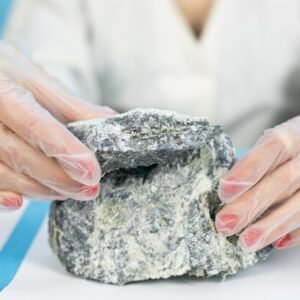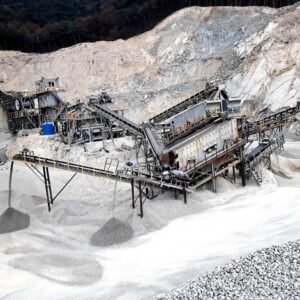Bentonite clay is a unique, versatile material renowned for its absorption, detoxification, and binding properties. It is widely used across various industries, from health and skincare to construction and agriculture. However, its effectiveness and usability depend significantly on proper storage. Whether you’re a skincare enthusiast, a health-conscious individual, or a professional handling industrial-grade clay, understanding how to store bentonite clay is critical.
It is an absorbent kind of clay and best to store hydrated bentonite clay or liquid clay in an opaque, ceramic, stoneware, glass or PET plastic air tight, non-metallic container. Keep hydrated or liquid clay out of direct sunlight and at cool room temperature. Bentonite clay is a completely mineral based compound, it doesn’t have the capacity to expire. Most bentonites are formed by the alteration of volcanic ash in marine environments. Clay masks dry within 10 to 20 minutes when exposed to air, so any leftovers must be stored immediately, quickly and properly to keep it usable.
There are mainly two types of bentonite i.e. Calcium Bentonite and Sodium Bentonite. They are used in following industries which are as follows: Oil Drilling Bentonite, Foundry Bentonite, Animal Feed Bentonite, Paper Bentonite, Civil Engineering Bentonite, Construction Bentonite, Pilling Bentonite, Geosynthetic Clay Liner Bentonite, Agriculture Bentonite, Horizontal Direction Drilling Bentonite, Iron Ore Pelletizing Bentonite, Water Well Drilling Bentonite, Cat Litter Bentonite, Earthing Bentonite, Water Treatment Bentonite, Pond Sealing Bentonite and Cosmetic Bentonite.
This guide will cover everything you need to know about bentonite clay storage, including its properties, the risks of improper storage, storage methods for different forms of clay, and troubleshooting tips.
What is Bentonite Clay?
Bentonite clay is a naturally occurring mineral-rich substance formed from volcanic ash. Its primary component, montmorillonite, gives it remarkable absorptive and swelling properties, making it highly effective in various applications. Here’s a breakdown of its uses:
- Skincare and Health: Used for detox masks, acne treatments, and internal detoxification (for food-grade varieties).
- Industrial and Construction: Used in waterproofing, drilling mud, and as a binder in foundry molds.
- Agriculture: Applied as a soil conditioner and to bind animal feed.
Because of its hygroscopic nature—its ability to absorb moisture from the air—bentonite clay requires specific care to maintain its quality.
Why Proper Storage of Bentonite Clay is Essential
Improper storage can compromise bentonite clay’s properties and render it ineffective for its intended use. The main factors that affect bentonite clay storage are:
1. Moisture Absorption
Bentonite clay is highly hygroscopic. If exposed to moisture or high humidity, it clumps together, making it harder to use in powdered form. Excess moisture can also dilute its absorptive capabilities.
2. Contamination
Bentonite clay can absorb odors, chemicals, and airborne particles. If stored improperly, it may lose its purity and effectiveness.
3. Microbial Growth
When bentonite clay is exposed to moisture, it becomes a breeding ground for bacteria and mold. This is particularly concerning for food-grade and skincare applications.
4. Loss of Shelf Life
Although pure bentonite clay has an indefinite shelf life when stored correctly, improper storage can cause deterioration over time, especially for premixed products.
Ideal Storage Conditions for Bentonite Clay
To maintain its quality and usability, bentonite clay must be stored under optimal conditions. The following guidelines ensure long-term preservation:
1. Dry Environment
Humidity is the number one enemy of bentonite clay. Always store it in a dry location with low humidity levels, ideally below 50%. Avoid areas like bathrooms or basements, where moisture levels tend to be higher.
2. Cool Temperature
Extreme temperatures can degrade the quality of bentonite clay. Store it in a cool, stable environment, ideally between 10–25°C (50–77°F).
3. Airtight Containers
Airtight storage is essential to prevent air and moisture exposure. Use containers with secure seals to lock out contaminants.
4. Avoid Sunlight
Direct sunlight can cause the packaging to break down over time, leading to contamination. Store bentonite clay in a shaded area away from windows.
How to Store Bentonite Clay: Practical Steps
The specific storage method depends on the form and intended use of the bentonite clay. Below are the best practices for storing different types of clay:
A. Storing Powdered Bentonite Clay
Powdered bentonite clay is the most common form and the easiest to store. Follow these steps:
1. Choose the Right Container
- Airtight Jars or Containers: Glass jars with tight lids are ideal for small quantities. Plastic containers with sealing lids also work well.
- Heavy-Duty Plastic Bags: For larger quantities, use thick, resealable bags. Double-bagging can provide additional protection.
- Industrial-Grade Drums: For bulk storage, use lined drums or heavy-duty bins with lids.
2. Keep It Labeled
Label the container with:
- The type of clay (e.g., food-grade or industrial-grade).
- The date of purchase.
- Any specific instructions (e.g., “keep dry” or “do not refrigerate”).
3. Store in a Dry, Cool Space
Place the container in a pantry, cupboard, or storage room that meets the ideal conditions outlined above.
B. Storing Premixed Bentonite Clay
Premixed clay, such as skincare masks or suspensions, requires different care:
1. Refrigeration
Store premixed products in the refrigerator if the manufacturer recommends it. This prevents spoilage and microbial growth.
2. Use Clean Utensils
Always use clean, non-metallic tools to scoop or apply the product. This minimizes contamination and preserves the product’s integrity.
3. Seal the Container
Ensure that the lid is tightly closed after each use to prevent drying out or contamination.
C. Bulk Storage for Industrial Use
For large-scale operations, bentonite clay is often stored in bulk. Here’s how to handle it:
1. Use Industrial Containers
- Lined Sacks: Heavy-duty bags lined with moisture-resistant materials are commonly used for shipping and storage.
- Storage Bins: Place sacks in sealed bins or drums for extra protection.
2. Protect from Rain and Humidity
If storing outdoors, use tarps or waterproof covers. Ensure the storage area is well-ventilated and dry.
3. Maintain Separation
Keep bulk bentonite clay away from chemicals, fuels, or other materials that may release odors or pollutants.
Common Mistakes to Avoid
Even a small mistake in storage can compromise the quality of bentonite clay. Avoid these common pitfalls:
1. Using Porous Containers
Do not store bentonite clay in paper bags, cardboard boxes, or unlined sacks. These materials allow moisture and contaminants to penetrate.
2. Mixing Old and New Batches
Mixing batches can result in uneven quality or contamination. Always store new clay separately.
3. Overlooking Moisture Control
Ignoring humidity levels can lead to clumping and microbial growth. Consider using silica gel packs or dehumidifiers in your storage area.
4. Storing Near Chemicals
Bentonite clay absorbs chemicals and odors from the environment. Avoid storing it near cleaning products, gasoline, or other strong-smelling substances.
How Long Can Bentonite Clay Be Stored?
The shelf life of bentonite clay depends on its form and storage conditions:
1. Powdered Clay
Pure powdered bentonite clay can last indefinitely if stored in optimal conditions. Its natural properties remain intact over time as long as it is kept dry and uncontaminated.
2. Premixed Products
Premixed products have a limited shelf life, usually 6–12 months. Always check the expiration date provided by the manufacturer.
Troubleshooting Storage Issues
If you suspect your bentonite clay has been improperly stored, here’s how to address common issues:
1. Clumped Clay
- Solution: Break apart clumps manually or sift the clay using a fine-mesh sieve.
- Prevention: Store clay in an airtight container with a silica gel pack to absorb excess moisture.
2. Mold or Odors
- Solution: Discard the clay. Moldy or contaminated clay is not safe for use.
- Prevention: Ensure storage containers are clean and dry before adding clay.
3. Dried-Out Premixed Clay
- Solution: Add a small amount of water (for external use only) and mix thoroughly.
- Prevention: Always seal containers tightly after each use.
Advanced Storage Tips
For those working with large quantities or specialized applications, here are additional storage tips:
1. Use Silica Gel Packs
Silica gel packets can be placed in containers to absorb excess moisture and maintain a dry environment.
2. Vacuum-Sealing
For long-term storage, vacuum-sealing powdered clay is an excellent option to remove air and prevent contamination.
3. Monitor Storage Conditions
Consider using a hygrometer to monitor humidity levels in your storage area.
Enhancing Storage with Additional Precautions
For those handling large quantities of bentonite clay or using it for critical applications, taking extra precautions can be invaluable. For instance, adding a moisture absorber, such as silica gel packs, directly inside the storage container can help ensure the clay remains completely dry. These small additions act as insurance, particularly in regions with high humidity levels, where environmental control can be challenging.
Another effective method is vacuum-sealing bentonite clay. By removing air from the storage environment, this technique eliminates exposure to both moisture and airborne contaminants. Vacuum-sealed bags can be especially useful for long-term storage or shipping clay across different climates. However, this method is best suited for powdered clay and requires specialized equipment.
Consideration for Different Grades of Bentonite
Bentonite clay comes in several grades, such as food-grade, industrial-grade, and cosmetic-grade, each tailored for specific uses. While the core principles of storage remain the same, food-grade bentonite demands extra care to avoid contamination. Always store food-grade clay separately from other materials, particularly those with strong smells or chemical components, as it may absorb odors or particles, making it unfit for consumption.
Similarly, industrial-grade bentonite, often used in construction or manufacturing, can be stored in less stringent conditions as long as it remains dry. Cosmetic-grade clay, typically used for skincare, should be stored away from bathrooms or humid areas, as the frequent exposure to steam can degrade its quality.
Addressing Regional and Seasonal Variations
Storage conditions may vary depending on your location and climate. In coastal regions or areas with high humidity, bentonite clay requires more robust protection against moisture. Investing in a dehumidifier for the storage area or choosing climate-controlled storage spaces can prevent clumping and microbial growth.
Seasonal changes can also affect storage. For instance, during rainy seasons, humidity spikes could compromise even well-stored clay. Regularly inspecting your storage containers and adding desiccants during such periods can help maintain the clay’s integrity. Awareness of regional and seasonal factors ensures that your bentonite clay remains in prime condition year-round.
Reusing and Recycling Bentonite Clay Containers
Properly managing your storage materials can make your setup more sustainable and cost-effective. Airtight containers and heavy-duty bags used for storing bentonite clay can be cleaned and reused multiple times, provided they are thoroughly washed and dried before refilling. Avoid using the same containers for multiple grades of clay without cleaning, as residues can cross-contaminate and affect the purity of the new batch.
Additionally, recycling damaged or unsuitable containers reduces waste. For instance, old glass jars or plastic bins can be repurposed for non-critical storage applications or for holding tools and accessories used with bentonite clay.
Educational Benefits of Proper Storage
Understanding how to store bentonite clay goes beyond preserving its quality; it also equips you with knowledge that can be applied to storing other hygroscopic materials. For example, similar storage principles apply to substances like activated charcoal, baking soda, or powdered herbs, which share the same vulnerability to moisture and contamination. This knowledge is particularly beneficial for those interested in natural health and DIY remedies, where handling raw materials is common.
Additionally, businesses that rely on bentonite clay—whether for skincare products or industrial solutions—can minimize losses and improve efficiency by implementing these storage techniques. Proper handling and storage not only extend the product’s life but also reduce waste, contributing to better overall resource management.
Final Thoughts on Long-Term Storage
Long-term storage of bentonite clay doesn’t have to be complicated. The key is to understand its properties and environmental vulnerabilities, then create a storage setup that addresses those factors. By keeping bentonite clay dry, cool, and free from contaminants, you can ensure its longevity for years, if not decades.
Ultimately, investing time and resources in proper storage techniques saves money and effort in the long run. Whether you’re a casual user or a professional, these strategies will help you get the most out of your bentonite clay, ensuring it remains an effective, versatile material ready for use whenever you need it.
Proper storage of bentonite clay ensures its longevity, purity, and effectiveness across various applications. Whether you’re using it for personal skincare, health purposes, or industrial projects, adhering to these best practices will keep your clay in optimal condition.
By following this comprehensive guide on how to store bentonite clay, you can maximize its shelf life and enjoy its numerous benefits for years to come. Invest in the right storage solutions, maintain a clean environment, and regularly check for signs of deterioration to ensure your clay remains as good as new.
FAQs About Storing Bentonite Clay
Q1: Can I store bentonite clay in my kitchen?
Yes, as long as the kitchen is dry, cool, and free from strong odors. Store food-grade clay separately from other types to avoid cross-contamination.
Q2: What’s the best container for bentonite clay?
Glass jars, food-grade plastic containers, and industrial bins with tight lids are the best options. Avoid metal containers as clay may react with certain metals.
Q3: Does bentonite clay expire?
Pure powdered clay does not expire when stored properly. However, premixed products may degrade over time.
Q4: Can I store bentonite clay in the freezer?
Freezing is unnecessary for powdered clay. Premixed products can be frozen if recommended by the manufacturer.







